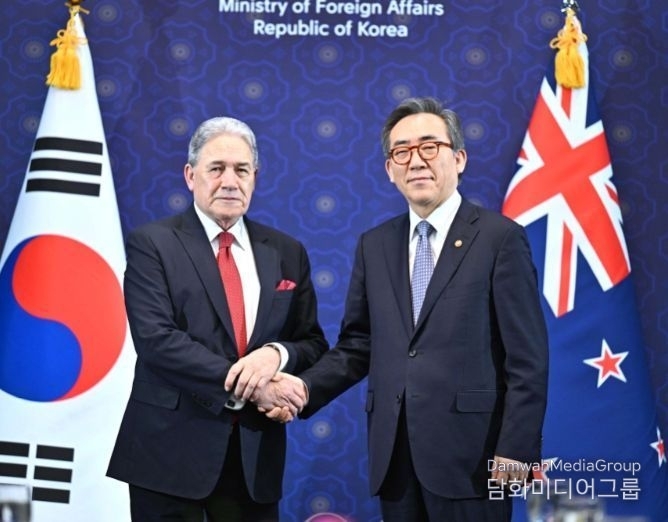By UN Journal Kayla Lee
Foreign Minister Cho Tae-yul held a luncheon meeting with New Zealand Deputy Prime Minister and Foreign Minister Winston Peters on July 15 to exchange views on issues of common interest, including high-level exchanges, practical cooperation, including the economy, and the Korean Peninsula and key regional issues.
Cho noted that New Zealand is a longtime ally that participated in the Korean War, and that the two countries have maintained close communication and cooperation as similarly situated countries with shared values.

In response, Deputy Prime Minister Peters emphasized the importance of cooperation among like-minded countries in the face of challenges to the norm-based international order, and said that New Zealand attaches great importance to developing cooperation and relations with South Korea.
The two ministers also exchanged views on ways to promote economic and people-to-people exchanges between the two countries.
The two ministers appreciated the close high-level exchanges between the two countries, including the Korea-Japan-Australia-New Zealand Summit (July 11 in Washington), which was hosted by New Zealand on the sidelines of last week's NATO Summit, and the Korea-New Zealand Foreign Ministers' meeting today, and agreed to continue close communication, including exchanges at the summit level.
Regarding the situation on the Korean Peninsula, the two ministers agreed that North Korea's continued provocations and close proximity to Russia threaten not only the Korean Peninsula but also global peace and stability, and that it is important for the international community to respond and cooperate in a unified manner.
In this regard, the two ministers appreciated the joint statement issued by the leaders of the four countries - South Korea, Japan, Australia, and New Zealand - on the occasion of the NATO Summit, which sent a strong warning message to Russia and North Korea and expressed the united will of the international community, and agreed to continue to work closely together.
The two ministers agreed that their countries share a vision of peace and stability, prosperity and resilience, and a rules-based order in the region, and they will continue to explore ways to work together.
In addition, the two ministers discussed the situation in the Asia-Pacific region, including engagement in the Pacific region, and efforts to engage in Africa and Central Asia, and shared concerns about the recent war in Ukraine and the situation in the Middle East, and agreed to continue to strengthen solidarity by continuing humanitarian assistance to the region.

